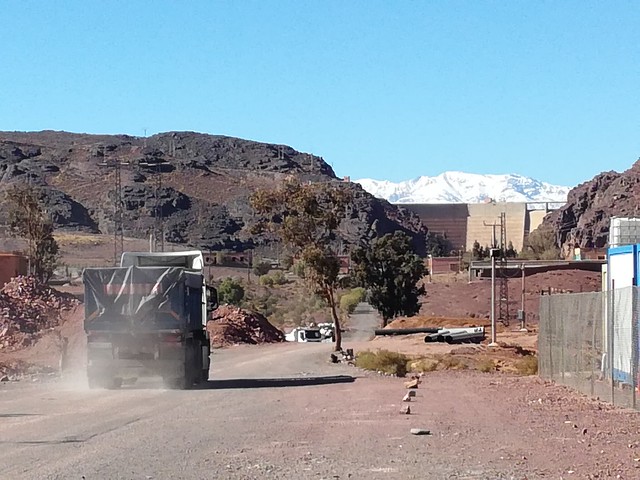Bassou
On our way West and then South, a ditch appears on our right hand side, with pipes waiting to be lowered into it. This is a big project, and we wonder what’s going on. The answer reveals itself some 30km further down: there is a new reservoir, only noticeable by a tiny piece of a dam in an opening of the mountain range on our right:
Outside the nearby quarry enclosure we meet Bassou, a philosopher in the middle of nowhere, who can answer not only our questions re this water project, but gives us many more insights into things that have puzzled us in the last 7 weeks.
This is a new reservoir to collect water for Ouazarzate and the villages south of Ouazarzate. But Ouzarzate has its own reservoir? Yes, but the water is polluted and cannot be used for drinking water. This is a drinking water project. If this river here is dammed for a reservoir, doesn’t that create problems for the villages here? On the contrary, they are happy. The river used to be unpredictable, sometimes there would be droughts and then terribly destructive floods, with the water destroying the crops and villages but then just running off into the desert. Now this can be controlled and everyone can still have enough water. Wouldn’t it be more effective to resolve the problem of pollution in the already existing reservoir? Yes, Morocco has a lot of water problems to solve, but this here is an ambitious project, which they hope to finish in the next couple of years.
Bassou fascinates me, with deep set eyes which penetrate you straight away, but also envelop you with kindness. He is a wise man and, having spent a number of years in Europe, not only is he fluent in various languages but he also understands how we think and can ‘translate’ between the Moroccan and the European way of thinking (if there is such a thing). We seize on the opportunity to ask a whole number of questions: What is the situation on recycling here in Morocco? Yes, it does exist, but not in the same, institutionalised way as in Germany, for example. Here, first of all, people will give things another life. Plastic bottles are used for all sorts of things and old tyres, for example, may be turned into a bucket, and once that is broken, we might use it again to make soles for our shoes. There are also individuals who make it their business to collect plastic, glass, metal etc. and then transport it to Casablanca and sell it to the big factories. So, no there is no collection of recycling but if you ask around in a village, you will be able to locate a person to whom you can give your empty bottles etc.
Bassou also gives an interesting new perspective of the deeply engrained hospitality here, which we seem to have largely lost in Europe: here in Morocco, we’ve been invaded by so many cultures, starting from the Phoenicians. We are a big mix of cultures and for a long time we’ve been confronted with different ways of speaking, different points of view and different ways of doing things. We have a culture of wanting to find out about and understand the Other, to learn their language and understand their point of view. This is why we welcome strangers.
It is indeed true that in addition to the hospitality, people often want to practise their language skills and want to get engaged in conversations that help them understand how we see things, or for them to tell us about their culture. People just engage you in conversation, even if you only wanted to buy a fish sandwich at a market, and they ask you about where you are from, what your life is like, do you have children, how do you live? There often is the underlying question of ‘who are you’ in its essence, ‘how do you tick’, ‘what is your passion’, ‘how do you see the world’. And it invariably ends with ‘Bienvenue au Maroc’.
We share with Bassou our deep upset about the unwelcome that immigrants to Europe experience these days, and our shame at the contrast between that and what we experience here. There is a moment where we really connect on a deep heart level and he really listens and sees into us. We talk about the need for a more open and mutually sharing environment in this day and age, a meeting of cultures to rise to the challenges of climate change, pollution and peace together. Bassou has seen enough of Europe to know that it has plenty of problems, that Morocco could be an equal partner in the contribution of ideas on how to meet the challenges. There are many things working here that don’t work anymore in Europe, and often they are of a more hidden nature than meets the eye.
As we have lunch already cooked, we invite him to share a meal with us. A few telephone calls and he’s able to free himself from work to join us. Another man, hitching a lift to his home in the hills some 70km from here, is dropped off at this crossroads in the middle of nowhere and we invite him too, as well as a local farmer on his way home (he looks very emaciated, I think he needs the food most), plus three dogs who are attracted by the smell of cooked meat. There’s enough for everyone and it feels great to be sitting here, in the stony desert by a dusty crossroads and be talking about the deep stuff. When we leave, we feel deeply nourished.
Posted in Uncategorizedwith comments disabled.
